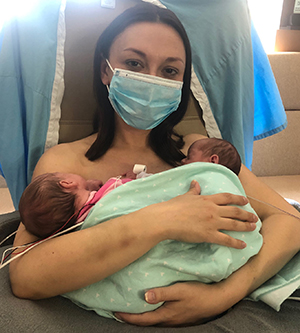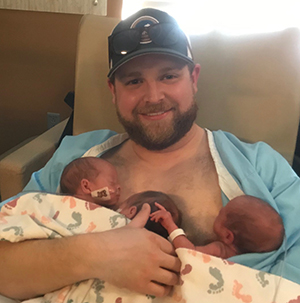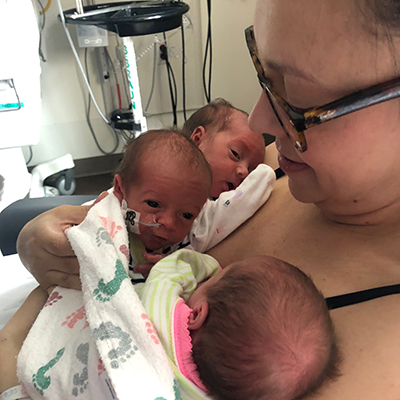Love Multiplied
Birthing Services“The hospital and doctors did a great job of letting us know what to expect, as they continued to receive new information on protocols, procedures and hospital rules related to the virus.”
Couple the excitement of a new baby and the scariness of delivering during a pandemic – then multiply that by two, three and even four.
Since March, CentraCare – St. Cloud Hospital assisted in the delivery of 15 pairs of twins, one set of triplets and one group of quadruplets. Multiples can be challenging for parents. But during a pandemic, the anxiety and uncertainty for parents can also multiply.
Katie Dorn and Eric Lucker of Sauk Rapids were shocked when they learned they were expecting triplets after doing in vitro fertilization (IVF).
“When we put in two eggs, we knew twins were a possibility,” said Katie. “We should have paid more attention in biology class, because it never crossed our minds that both could stick and one (or both) might split. Once we got over the shock, we both stepped into high gear and started planning.”
Then came the news of COVID-19 quickly moving across the globe, changing the lives of everyone, especially those seeking medical care.
As a result, Eric was unable to attend some of Katie’s later ultrasounds, so they relied on photos and FaceTime. And the idea of isolation wasn’t all that bad for Katie.
 “Social distancing was all I wanted to do at the end of my pregnancy, so that wasn’t hard. I was able to ‘next level’ nest. Our entire house is organized, labeled and laminated,” she said.
“Social distancing was all I wanted to do at the end of my pregnancy, so that wasn’t hard. I was able to ‘next level’ nest. Our entire house is organized, labeled and laminated,” she said.
Katie was seeing CentraCare OB/GYN David Kroska, MD, through her infertility journey and for her prenatal appointments. When it came to delivery, Dr. Christina Bulisco delivered her triplets via C-section.
“She was absolutely amazing and went above and beyond to make us feel comfortable and informed. She and Dr. Kroska worked closely together to ensure that I received the best possible treatment and care,” said Katie. “The hospital and doctors did a great job of letting us know what to expect, as they continued to receive new information on protocols, procedures and hospital rules related to the virus.”
It was a rough delivery for Katie, and she wasn’t able to see her babies right away. Eric stayed with their three daughters in the Neonatal Intensive Care Unit (NICU), where he was able to spend time bonding time with Gianna, Penelope and Vivian.
Once Katie was released from the hospital, the visits to the NICU became precious. But because of COVID-19, those visits looked different.
“Visitor restrictions not only affect the adult world,” said NICU Director Diane Pelant. “In an effort to keep our tiniest babies safe, parents have to visit one at a time rather than together. One parent per day is now the new norm, regardless if there are multiples.”
That means Katie and Eric are not able to see the triplets every day. While it’s one of the hardest parts for Katie, she knows the visitor restrictions decrease foot traffic and potential exposures in the NICU.
“While not ideal, the NICU has found creative ways to assist parents through the use of video chat and NICVIEW cameras, where they can view their babies at any time and from anywhere,” said Pelant.
“I feel so attached to them already. My husband and I love to watch them on the NICU cameras and share stories of our visits with them,” said Katie. “Although it is tough not being able to visit them together, we know it is for the best and it is only temporary until they get home and we have our arms full of babies.”
Once they are able to take their girls home, getting help also will look very different because of the pandemic.
 “When you find out you are having multiples, the biggest piece of advice given to you is to ask for and accept help — from cleaning to babysitting to meal support,” said Katie. “With the coronavirus, we realized we can’t accept much of this support. Our families can no longer visit, our friends can’t come and help, and our plates are full of added tasks like dog groomer, hair stylist — all while working less and getting less sleep.”
“When you find out you are having multiples, the biggest piece of advice given to you is to ask for and accept help — from cleaning to babysitting to meal support,” said Katie. “With the coronavirus, we realized we can’t accept much of this support. Our families can no longer visit, our friends can’t come and help, and our plates are full of added tasks like dog groomer, hair stylist — all while working less and getting less sleep.”
But Katie understands that everyone is struggling right now and by remaining patient and allowing for grace, they are finding ways that their loved ones can help.
“We have found that there is help we can accept — by allowing friends to walk our dog, having a cooler outside for meal train drop offs and accepting gift cards and words of encouragement from friends and family.”
Despite her girls still being in the NICU, Katie is completely embracing her new role as a mom and plans to be with her triplets on her first Mother’s Day.
“I now understand what moms mean when they say, ‘Your presence is all the presents I need.’ I just want to be with them for some Mother’s Day snuggles!”
Our Family Is Here to Help You Start Yours
Learn more about the Reproductive Medicine Program at CentraCare
